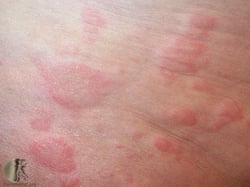What is chronic urticaria and angioedema?

- Chronic urticaria is raised bumps or patches of itchy red skin. It is also called hives, wheals or whelps. It is often very itchy. Chronic urticaria means there are hives at least 2 days a week for 6 weeks or longer.
- Angioedema is swelling that happens deeper in the skin.
- It can affect children or adults.
- Some patients have only urticaria or angioedema. Some patients have both.
What are the symptoms?
Hives can develop anywhere on the body. A single hive can be small or large. They can be different shapes. A single hive is often gone in less than 24 hours.
In angioedema, the lips, ears, tongue and eyelids can get very swollen. Other areas of the body with thicker skin may feel hard or painful.
What causes it?
Certain cells in the skin make a chemical called histamine. Histamine causes the hives. In chronic urticaria and angioedema, cells release histamine too easily.
Sometimes it is caused by a reaction from a person’s own body. This is called auto-immune. Sometimes the cause is unknown. This is called idiopathic.
Chronic urticaria is not caused by allergies to foods, medicines, pets, chemicals or insects. It can not be spread to other people. It can be made worse by:
- viral infections.
- emotions or stress.
- pressure, heat, or cold.
- vibration or exercise.
- alcohol or pain medicines.
- scratching.
How is it diagnosed?
- A medical history and skin exam is done. The doctor may gently scratch the skin or put something warm or cold on the skin. This is to help find triggers.
- Testing for a cause is not needed to treat or manage the condition.
Allergy testing is not recommended. This condition is not caused by foods, medicines or chemicals. Autoimmune testing is not recommended.
How is it treated?
- Antihistamine medicine can often help reduce symptoms.
- Medicines like cetirizine (Zyrtec®), loratadine (Claritin®) or fexofenadine (Allegra®) may be used. They usually have few side-effects. If needed, a provider will tell you how much to take.
- Medicines like diphenhydramine (Benadryl®) or hydroxyzine (Atarax®) may also help. These medicines do not last long and can make you feel tired.
- Other medicines can be used if symptoms are not better.
- Avoiding alcohol or pain-killers (narcotics, ibuprofen, aspirin) may help. Acetaminophen (Tylenol®) is ok.
- If cold is a trigger, stay away from the cold. Severe symptoms could develop, especially with cold water. Your doctor may recommend an emergency medicine called epinephrine (EPIPEN® or AUVI-Q®).
What does not usually help?
- Anti-itch skin creams or moisturizers.
- Changing soaps or detergents.
- Changing foods eaten.
How long will it last?
- There is no cure, but medicines can make the symptoms better.
- This condition often gets better on its own.
- Most patients get better in a few months to a year.
- Symptoms rarely last more than 5 years.
- There is no test to find out how long symptoms will last.



